
HOW TO MAKE MONEY WITH A BLOG FOR BEGINNERS?
Can you really make money blogging? You’ve probably been getting confused while reading the income reports about bloggers who are making huge money in a month.
It actually is possible to make a good amount of money with a blog for beginners but it cannot be done immediately after you started the blog. There are many examples of blogs that make money after a period of time that could vary from 8 months to 2 years.
How to start a blog and make money?
This article goes into great depth and detail on how to start a blog and make money from it. It’s not the same as the “start a blog” post with the general guidelines.
I will provide actionable tips and tutorials on setting up your blog correctly and the steps for making money as a beginner. I have made the Table of Contents below to help navigate easily.

My blog posts may contain affiliate links. That means if you purchase an item through these links you will get the best price and I may earn a commission at no additional cost to you. Please read the full disclosure policy for more info.
How do I start a blog? Here is the table of contents for making your navigation easier.
Section 1: Money Blogging for Beginners: How to Choose the best niche for your blog that Makes money
Choosing your niche is the most important part to start a blog and make money. It’s also one of the areas where beginners do not do any research into.
How to pick a niche that you’re going to write about needs a little research at the beginning but will help your blog make more money in the long run.
✅ I use and recommend HostGator for domain hosting and buying your domain.
What is a blog and how do I start a blog?
A blog is nothing but a website that is updated frequently with new content. Typically the writing is done by one person in an informational but conversational style.
A blogger will be able to express his style and personality through his posts while helping their readers with solving their problems.
Is it too late to start a blog?
I can reply to this with a big “no!” While many blogs have been running for years, people still have problems they want to get it resolved.
I started this blog in 2020 and there were many people saying it was too late to start a successful blog that makes money. They’d be wrong.
If you’re capable of writing content that can solve people’s questions and solve their problems without focusing on yourself, then there is still an opportunity for you to start a blog and make money.

How long does it take to make money blogging for beginners?
As per the latest research, over 70% of blogs don’t make money. Probably most of them are spending their time on blogging just as a hobby.
I would like to be honest and tell the truth that making money blogging for beginners is a lot harder than you think.
Years ago someone could just post a 500-word article on one day about a problem that readers face and have Google send them traffic the next day.
In the case of a blog for a beginner, you’ll probably have no organic traffic from Google for at least the first 3 months. So be ready to bear with the early day syndromes.
It is normal that only after about 6 months a beginner can start getting a bit of traffic from Google if you’ve written blog posts after search engine optimization.
Using different social media platforms like Pinterest, Keen, or Facebook were some of the ways for a beginner blogger to get traffic but the platform has changed recently and it’s no longer a great source of free traffic. It takes more time and effort to build a brand on social media and get it viral.
Can you really make money blogging? Yes when you start getting organic traffic from search engines to the blog posts that sell your own products or affiliate links (products from other people and you get a percentage for referring), you’ll start earning a small amount of money.

To make money blogging for beginners you need a realistic approach. So many bloggers leave the blogging platform within their first year because they started the blog with unrealistic expectations. They might have started the blog after reading some blogger’s income reports about how they made money within 3 months of blogging. There are exceptional cases where people make overnight success because of some luck and unexpected traffic spike.
It is less probable that a brand new blogger will have the experience to start earning like a pro-blogger unless they have prior knowledge of the online business. Most of those so-called beginners who claimed to earn thousands of dollars within three months of launching the blog are often experts with years of experience in SEO (Search Engine Optimization).
If you are planning to make money with a blog for beginners, you’ll need to commit to working at it for at least 12-18 months before any chance of a possibly giving up. If this sounds like something realistic, then keep reading for all the nitty-gritty details to learn money blogging for beginners.
How to choose a niche for your blog to make it a money magnet?
Choosing your niche is the most important step in your blogging journey as a beginner. A niche can be considered as the main topic that your blog will cover.
Though it is preferred to choose a niche that you enjoy and is passionate about, if your goal is to create a blog and make money, then you need to have a different approach to choosing it.
It is a fact that all niches are not as profitable as others. If your aim is to make money from blogging via passive income streams through affiliate marketing, some niches have very few readily available options.

Here are some of the most profitable blog niches to make money:
Health/Fitness – Most people are always looking for ways to become healthier and in shape and so fitness plans and healthy eating, are some of the popular niches.
Wealth/Money – Any advice on investing, stocks, personal finance, or making money will be greatly appreciated by readers.
Parenting – A lot of moms are searching for tips on better parenting and so sharing your parenting adventures will be a good topic.
Travel – If you are a traveler, then any topic related to travel could be a good option for you.
Food – This can be a good source of ideas for someone creating recipes.
Sports – Some sports are a lot more profitable in areas like golf. The players are likely to spend more on equipment than some other sports.
Beauty/Fashion – This is another good topic for anyone who can give tips on enhancing beauty and leveraging Instagram to drive more traffic.
DIY/Craft – Find out the right affiliate program and then build your blog around the affiliate items to make it a more profitable blog.
Google is said to be ranking the blogs if you are an expert who has authority in your inch. For example, doctors, and certified financial accountants who make blogs on money, and life topics will be getting more priority than others.
How do I start niche research?
Since your ultimate aim is to start a blog that makes money you should first do research on the affiliate programs to check its profitability over a specific niche. You can do a Google search for the “affiliate program and your niche” to see what’s out there so you can decide if it’s the items you’d want to refer to in your blogs.
Another way to find a suitable blog topic is to look for income reports of other blogs in the same niche. Use a critical eye on analyzing the income as many of them over-exaggerate the figures to sell you their blogging tips and courses.
It is not advisable to choose the Lifestyle niche:
Though lifestyle is another popular blog category for new bloggers. Always go for a specific subcategory of the topic to help your posts build authority and get high in the search rankings, especially when you’re competing with other niched-down sites. It is because if you change posts on different topics on each day it will be difficult for Google to classify into a particular niche to grade with an authority. So the best idea to make a successful blog is to choose just one niche at first, create a lot of content and authority, and then slowly add another niche into it, and so on.
I am not saying that you can’t be successful with any niche that you really like, it’s just that the success stories for some areas are fewer and farther between. I believe your aim is to have a blog that makes money, right?
Section 2: How To Set Up A Blog Correctly
In this section, Let me tell you the more tech-related side of starting a blog. I’ll explain to you how you can buy a domain name, choose web hosting, and get started.

1. Choose a domain name
It is the identity of your blog as your website will be known by the domain name. It’s what you type in the web address bar and how people will find you on the internet.
✅ I bought my domain name through Hostgator and highly recommend them. They offer free domain names along with a hosting package.
Think over before booking a domain name because it’s a bit difficult to change your domain name later on although it’s technically possible.
Find out the available domain names that are shorter, easy to spell, and in a way relate to your niche. Dot coms should be preferred since that’s what most people will assume you have.
Go to Hostgator and try to book hosting and then you will find the option to get a new domain name.
For this blog, I chose the name ‘BookWebmaster’ because I had booked around 100+ domains that include mine and my clients, and I have always been addicted to Google Webmaster tools to see how each domain/websites behave on changing the contents/backlinks over the years. So I thought of offering my findings and experience to my readers through a blog like this.
Take these tips for picking your domain name:
- Keep it short
- Make it a catchy one
- Avoid numbers in the name
2. Choose the right Blogging Platform
How to start a blog and get paid using the right blog platform?
Starting a blog on the right platform will have effects on the success of your blog. There is a lot of options to choose from so I’ll list them out for you:
What is a blogging platform and why should I use it to make my blog?
A blogging platform is software that allows you to make and publish content in your blog. This is different than a blog’s theme which is just an aesthetic way of how the blog looks.
There are a number of blogging platforms and few of them are heavily advertised. Some of the platforms are free with hosting and others will cost money.
Here are the most common blogging platforms.
- WordPress.org
- WordPress.com
- Blogger
- Medium
- Constant Contact Website Builder
- Wix
- Squarespace
- Gator
You should bear in mind that it will be very difficult to make money using free hosting. Free hosting with free blogging options like WordPress.com have limitations on what you’re able to promote to make money.
Secondly, the free platforms may decide to put their own advertisements on your blog and you are not going to get any of the profit. You should better say no to free hosting as the blog often look unprofessional because of it.
Third, with free platforms, you may not be able to join any advertising networks or the platforms may not be optimized for search engines like Google. There is also limited support and customization available.
All of these points imply getting your content published with popular blogging platforms as WordPress.org hosted on a paid hosting.

WordPress.org vs WordPress.com
WordPress.org and WordPress.com are the same software. The main difference is that with WordPress.com, your blog will be hosted by them for free. You aren’t going to make money on a free platform.
If you use WordPress.org it is a free platform that you can download and install on a paid hosting which I’ll explain in the next point.
WordPress vs Wix or Squarespace
WordPress.org is the most used blogging platform in the world and makes up 34% of all websites. It is interesting to note that some of the biggest brands in the world are using WordPress as well for their websites and blogs.
The freely downloaded WordPress.org CMS is the best for customizability, scalability, and monetization as you get complete control over the blog.
There is a chunk of time for learning WordPress to use and that is why some people opt to start with Wix or Squarespace. Those platforms are designed with drag-and-drop builders for easy use. However, these platforms aren’t optimized for search engines and it’s probable that starting a blog and getting paid can be a distant dream for you.
It may also require an expert developer to transfer your free-hosted blog to a paid one down the road which is why I recommend starting with paid hosting and the free WordPress.org CMS from the start.
3. Buy Web Hosting
How to start a blog for money on paid web hosting?
Even though the WordPress.org software is free, you’ll need to host it on a server. This is where web hosting comes in.
✅ After doing tons of research, I confidently use and recommend HostGator for web hosting.
What is a web host?
A web host is a secure place that stores your blog data on its servers.
How much does web hosting cost?
There are a lot of players in the market with varying costs for web hosting from $2.75 per month to over $100. When you’re starting out, I recommend you can purchase the least expensive plan from a reliable company with proven technical support history and then upgrade the host as you need to with increased traffic that can be after a few years.
Why Hostgator is the best?
It is the cheapest way to start a blog.
Over the years I’ve used many hosting companies like GoDaddy, Bluehost, A2hosting, and Hostgator and I must say that Hostgator has by far been the best in terms of affordability, technical support through chat, and actually delivering what they promise. I know there is an almost equal number of bloggers going for Bluehost hosting. I recommend Hostgator based on my experience as I currently host all mine and my client’s sites with them as you can start a blog and get paid as easily as possible.
Reliability – They are not down for maintenance or display technical issues as often as other hosting companies.
Fast servers – Website speed is a critical factor for your blogs to get the best possible ranking with Google. Start your online journey with the best possible speed instead of trying to fix the speed issues after some time.
Amazing customer service – If you’re having trouble with something with the blog, you can immediately have a chat with their technical support and their help is quick and fast.
I had set one of the blogs on BlueHost as many of the big bloggers used to promote it so I assumed they were the best. After I had a 3-months term, I started having issues on site loading. Every time I got in touch with technical support, I used to get conflicting information.
The biggest notable thing is that BlueHost offers a high affiliate commission to bloggers who promote it. I’m disappointed that most of the bloggers who host their sites with other web hosting companies promote Bluehost so heavily for the purpose of earnings.
How to start a blog from scratch? Getting started with Hostgator
Hostgator web hosting plan selection
So I chose to host this blog with Hostgator because they offer unlimited disk and bandwidth space, they have great 24/7 chat support, and all that comes at an incredibly affordable price. In addition, while many bloggers often complain about technical support and downtime – so far I’ve never been hit by such issues as far as I know! And I am happy that I own a monetized blog now.
Now it is time to go to the HostGator website and start the process of getting your blog to life! As soon as you enter the website look for “Web Hosting Plans” (Hatchling / Baby / Business).
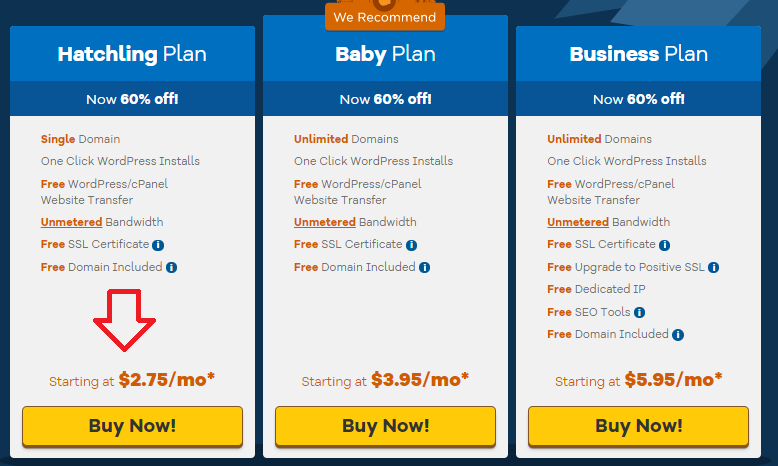
When you are presented with three choices of web hosting plans, I personally recommend buying the cheapest plan ‘Hatchling Plan‘ since you are just starting your blog and you may not need anything bigger than that even if you grow organically for another few years. If you are ready to invest a bit more dollars, you can also consider choosing a Baby Plan or Business Plan, in case you plan to own more than one domain or blog in the future or you need all the technical features listed under it.
Now it’s time for you to grab your domain. It is a piece of great news that Hostgator offers a 1-year free domain this season.

Once you found the perfect domain name and enter it into the space provided and choose .com (unless you prefer a country-related domain, but I highly recommend using .com extension as generally, the visibility is more with it in Google)
While booking the hosting it might ask you to choose many add-ons (additional services such as SSL Certificates SiteLock Essentials etc.), they are entirely up to you. There is nothing going to be wrong even if you did not buy any add-ons so I didn’t buy any but again, it’s up to the person. Free SSL will be automatically installed on your domain by Hostgator after 24 hours. You will be able to use free plugins to perform most of those services they provide if you really needed it at a later stage.
Now it will give an option to insert a coupon code – and lucky duck, you do! Type in “BookWebmaster” so you may receive your discount!
Now just fill up the rest of the details on the page – You may choose ‘hatchling’ and a hosting duration (I recommend to commit to at least one year though you can count more years to get the best rate), select a username and security pin and fill out your billing and payment information.
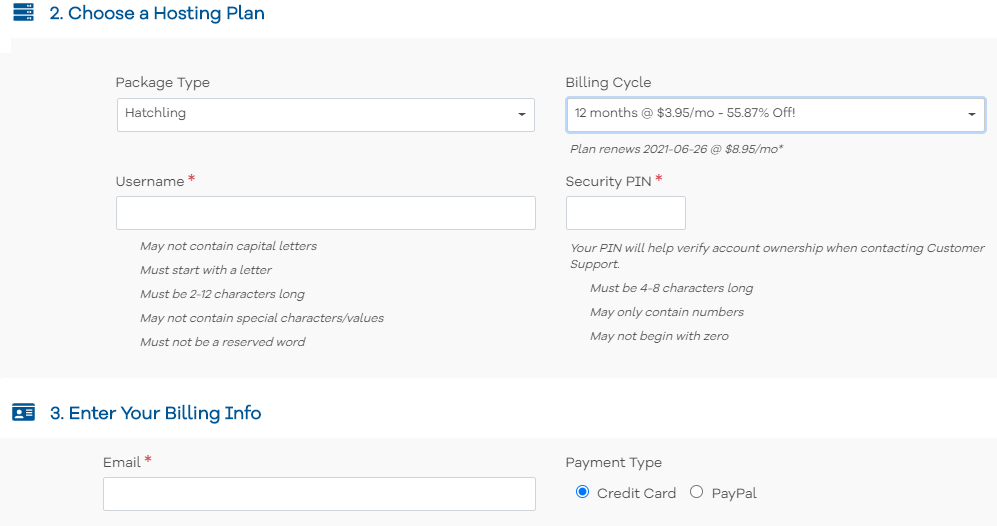
Once all done just click “Create your account!”
4. Installing WordPress and starting the blog from scratch
Now let us install WordPress CMS and start actually creating that beautiful blog of yours! Needless to say, if you use HostGator then this step will be super easy! Hostgator has the ability to do a quick WordPress install into your hosting space.
If you check your email now, your login information for your control panel should be available there. You can go to your control panel by either typing in yourdomain.com/cpanel where you can replace it with your actual domain or going to the link within your email.
From the control panel, installing the WordPress platform is easy. Just click the ‘Quick Install’ button under Software/Services and then you need to select WordPress on the next screen.
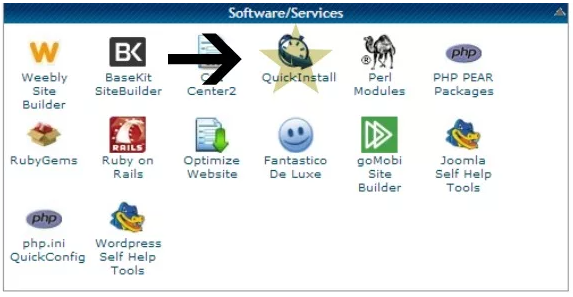
Now you can fill some information there and choose whether or not to allow auto-updates. I did not allow auto-updates in my blog, as I like to feel in control of it, although in the image below I left it checked. You can decide the locations of your WordPress files (at the root or any optional path such as domain.com/blog).
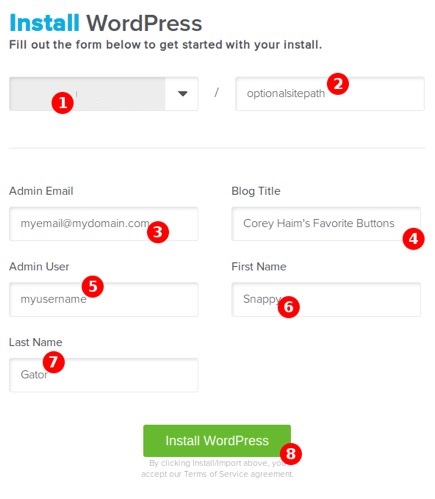
Last winter I helped a friend set up his personal blog, and it took nearly an hour and a half for his account to be active. When I started my blog it was done right away, but in general, it may take a few hours, so be patient to start a blog and get paid later!
Seen below is a WordPress dashboard. There is not a lot to start a WordPress blog, but you’ll find a lot of ways to use it.
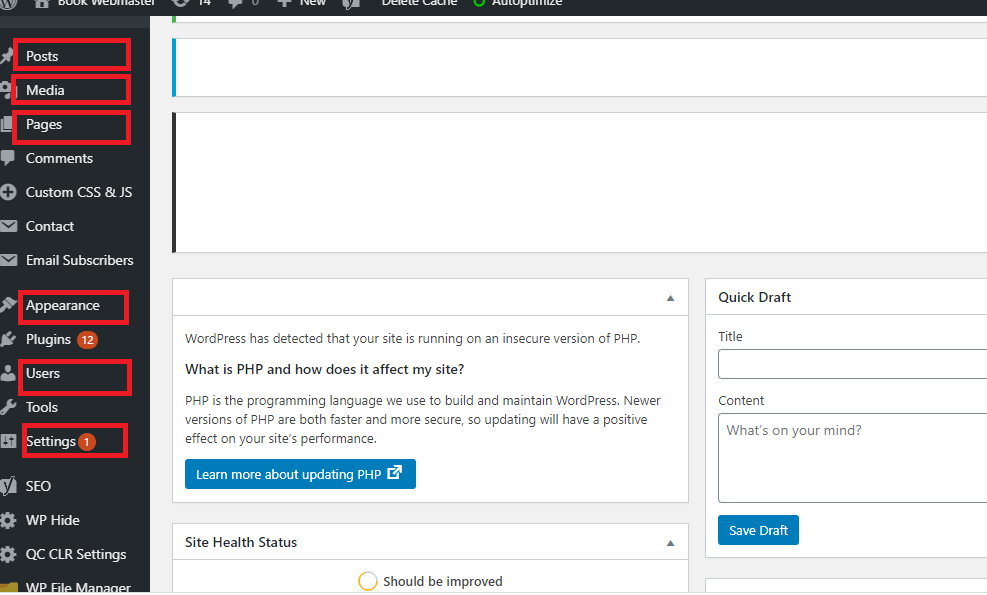
Posts: This is the place to post your articles by adding new posts or editing old ones. We will discuss it later in this guide, but for now, let me explain the other essential features a little further.
Media: Whenever you upload pictures, videos, and other files it will be stored in this area. If I’m being honest, you may never use this media area other than for renaming the images or picking the URL of the image/files.
Pages: Here is where you will be able to pages like About us/contact us etc and then later you can use Appearance -> Menu to set that page as your menu.
Comments: This is the place where you’ll go to check all of the comments posted on your blog articles!
Appearance: Here is the core space where you’ll spend the most time at the starting point of the blog deciding how you want your blog to look. You can pick out themes, mess around with widgets that your navigation bar and set your menu for header and footer.
Plug-ins: Plug-ins are another fun and very important part of your site where you can install many useful plugins and activate them (for example SEO plugin: Yoast). Plugins can add cool features and interfaces for a flexible way of working.
Users: Yo can find the users in your blog here. Currently, you are the only user as you just started your blog and you did not have an email subscription on your blog.
Tools: Right now, you won’t need this except for import and export options. Some plugins like velvet sit on it after activating it.
Settings: Here you can find all of the general settings for writing, reading, permalink structure, and commenting settings.etc that you can play around with.
WordPress Theme
Every blog can have a style that we call a ‘theme’. Now it is time to set a theme for your newly started blog. You can go to ‘Appearance’ and finding a free theme that you really like. At this point don’t necessarily need a paid theme until you are absolutely sure that blogging is something you invest your time for future. As soon as you find a theme there, you will be able to install and then activate it. Once you did the activation it should be up for your blog and whatever you post through Posts -> Add New will be displayed on the blog as per the style.
If you really need to use a paid theme you can buy it from Envato or I have listed out some themes here. If you are a girl I would recommend a feminine theme. You can buy it from Bluechic as I have seen many successful female bloggers using Bluechic, which implies that it is one of the best-performing WordPress themes. If you need a mobile-optimized theme used by many successful bloggers then get it from here. Once you bought a new theme you will be able to add and activate it in your blog through Appearance -> Themes -> Add New. The old style of your blog will be automatically replaced by a new theme. If you need a paid theme installation service feel free to contact me.
Regarding the WordPress theme, I use different themes for each of my blogs. There are several market place where you can buy a good theme. I recommend Envato, Astra, Genesis, and Bluchic. Astra is one of the fastest themes and is fully customizable. If you try the free version of Astra, that would be more than great to start your blog and if you need additional customizability, you can buy its pro version. I upgraded some of my blogs to Astra Pro and it looks professional and exactly as I envisioned.
Astra vs Genesis Framework
Astra and Genesis are two of the most popular WordPress frameworks. Both are technically well-performing but there are some key differences:
Astra’s framework and its templates are free and for the additional customizability, you have to pay for Astra Pro.
As far as Genesis is concerned, you have to pay for the framework and buy a Genesis child theme.
If you are using Astra, you will be able to customize almost everything without adding any coding knowledge. Astra is considered one of the fastest and most lightweight themes on the market. If you are purely non-technical I suggest using Astra and if you have got some coding knowledge, consider buying Genesis.
One thing to remember is to get a well-designed logo for your blog. You can easily get it done from Fever or Upworkalthough in the beginning, your blog content matters far more than your design.
How To Customize Your Blog’s Theme
Once your theme is uploaded from the Appearance > Themes > Add New, go to the blue Customize button underneath the theme or go to Appearance >Customize on the left-hand menu.
In the Customize view, you’ll see a variety of sections you can change and tweak to your liking and then publish those changes.
You started your blog with Hostgator now and It is time to add pages and posts:
Now let us learn to add content to your blog in detail! First You can go to Pages>Add new and create an ‘about me’ page. Yes, these are terribly awkward to write about oneself, but they are a standard necessity for any newly started blog. Once you fell in love with blogs and online money making, you will start reading the blogger’s ‘about me’ pages to know more about the way they blog and make money. I used to do in my early days of blogging and still do to connect to the blogger of my choice.
Once the ‘about’ page is ready, you can think about adding a ‘contact’ page which is almost necessary.
Using Appearance -> Menus -> Add Menu Items -> Custom Links you can get menu items by adding the page URL and link text.
You can publish your first post(s) through Posts -> Add New and all the posts will be displayed on the home page if you did not change the settings of your home page in the ‘Reading’ section of the ‘Settings’ page.
The top bar on your post editor (classic editor) is where you will be able to customize the look of your content. You can edit the justification, add links, insert a read more option, change the text size, underline, justify, and adjust the color from the post editor. If you did not find a post editor on top of your post editor you will probably be using a block editor. In such a case you can install a new plugin called ‘Classic Editor’ and activate it. You will get a more user-friendly editor for posts. It just takes some time playing around with the classic editor/block editor to get used to it, before publishing your first blog post.
Plugins and Widgets
Many bloggers including me choose WordPress as a blogging platform because it has got a vast array of plugins and widgets that allow you to customize your blog to any extreme. There can be a plugin or widget available for everything that you think a developer can only do.
It’s important that you don’t want to install so many plugins as they will slow your blog down if there are a lot.
Here are the recommend plugins once you just started your blog with Hostgator:
Limit Log-in Attempts: This plugin is going to help prevent people from breaking into your blog by repeated trial login attempts, it’s an absolute necessity to limit such an innumerable number of login attempts if you ask me.
SEO Plugin: These plugins will help you to work on search engine optimization (SEO), meaning your posts will be more likely to be seen on the front pages of Google if you use SEO plugins. Read here to choose the best SEO plugin.
WP Super Cache: This will speed up your site and cache all of the content on your blog so that you will get better speed ranking by Google! Just set up the default ones and better not to go for advanced settings at the start.
You will probably need more plugins as you grow with your blogging, but these are just the basic requirements. Feel free to explore this plugin section that will benefit your newly started blog!
Some Widgets that I recommend as soon as you started your blog:
Social Media Plugins and Widgets: This is where links to your social media pages for Facebook, Twitter, Pinterest, etc. will show up. A huge part of successful money-making blogging is networking and displaying your posts to readers at a place where they can find them super easily. Many paid themes come with social media plugins as an available widgets, but if your free theme doesn’t have one you can add a free plugin that will create a widget for you
Subscribe: You will want a subscription plugin to collect the email ids of your readers and then later send them many marketing posts to start a monetized blog. You will be able to add a little subscribe button on your sidebar by installing an appropriate plugin to build up your email list.
And now your question ‘how to start a blog with no money’ has ended up with a working blog for you!
Clap! Look at you! You have officially started a new blog yourself. You’ve made a blog with a great theme and all of the necessary plugins and widgets! Now it’s up to you to ensure that you prepare keyword-rich articles and post regularly, create pinnable images, build backlinks, and network with other bloggers.
Section 3: How To Write SEO optimized Blog Posts
SEO is something very important you have to focus on at the very beginning. Often beginners get overwhelmed by the looks and some social media traffic.
You should understand this as a big mistake. SEO is a constant process of refinement and it can take 6-8 months for a post to start reaching its ranking potential once you have done the optimization. It is recommended to write a post that is SEO done and go back over all your old posts for tweaking as per the ranking it gets.
What is SEO for a new blog?
SEO stands for Search Engine Optimization. You will need to structure the content and the main keywords in such a way that it will be easy for search engines, like Google, to read and send you free organic traffic.
Why is Google traffic considered the best for a blog that makes money?
Google is the largest search engine in the world with more than 3.5 billion searches per day. If your blog could grab the tiniest part of that, you will be experiencing a huge amount of traffic and this is where you really start to make money with your blog.
Google traffic is:
Extremely Targeted – People are always searching for answers in Google to their questions. So if you can suggest a solution to their problems, it’s a lot easier to recommend an affiliate product and get a commission over that.
Mostly Consistent – Even though the Google algorithm makes updates every year, if you could write a post that ranks well, it will usually stay fairly consistent in SERP.
Fairly Passive – Once you’ve prepared an epic blog post and published it, you don’t have to do a lot of maintenance on it. You can update your blog posts a few times to keep them relevant and fresh.
How to use SEO to get traffic to your blog and make money?
Here is the step-by-step method I follow before writing every blog post. If done correctly and hit the keyword target, you’ll get thousands of readers every month and your blog domain ranking will increase.
1. Initial Keyword Research
If you want to make a blog that makes money, you’ll need to write it for a focused audience. As you already started a blog on a specific niche, you can go deeper into the sub-niches. The more you have sub-niches on a particular topic, the more Google will see you as an authority on that topic.
For example, if your niche is rooftop gardening, find out some questions searching in your niche.
- How to make a rooftop garden
- What plans are good to grow for rooftop gardening?
- How to keep pests from ruining my rooftop garden?
You might be thinking now that how will you know if anyone is searching for these terms? Keep reading for my SEO keyword research tips.
2. Beginners should target Long-Tail keywords
Long-tail keywords are phrases made up of 4 or more words added to the main keyword. In the beginning stage of the blog, all bloggers should focus on these phrases because they are very specific which high authority domains often do not target.
Hence, the competition for these longer keywords is comparatively very less. Once your new blog starts ranking well with searches that have lower search volume, Google starts trusting your site, and you get the chance of ranking for the higher searched terms.
Remember, Google always wanted to show people content that answers their questions accurately.
3. How to do keyword research for blog SEO
I’m going to walk you through how to make keyword research super easy using two Chrome extensions which are freely available.
You’ll need to install Chrome extensions: MozBar, and Keyword Surfer. extensions to your browser.
Using these two extensions, I’m going to search Google the term “how to make a rooftop garden.”
Google search bar tutorial for long-tail keyword research using keyword surfer
As seen in the screenshot below the Keyword Surfer estimates the monthly USA traffic for this term is 50 per month and it is purely an estimation near to the actual figure to help us find the right keyword.
If you moved down in the search, you can see the domain authority DA of the sites displayed by Moz.
Domain Authority is just another search engine ranking score that indicates the authority of the domain which increases the likelihood of ranking for keywords. This is also an estimation only for our keyword research because Google doesn’t use it as it has got its own algorithm. Sometimes you need to log in Moz to see the domain authority displayed.
If the domain authorities of the sites on the first page of Google for this search term are too high and then it will be very difficult for a new blog to compete.
As a blog for beginners, you may need to see sites with DA’s of 20 or lower on the first page to anticipate the ranking of your post on the first page.
Finding Other Related Keywords
As we saw the specific keyword is too competitive, we need to find a similar less-competitive keyword.
For this, you need to check at the very bottom of the first page under Google Related Searches.
In the same way, you will be able to check the search volume and DA of these frequently searched keywords in Google.
Also on the right-hand side, Keyword Surfer will indicate keyword ideas and their volume.
Quora, Reddit, and Answer the Public are other places to find keywords based on what people are asking about your niche.
4. Create an epic blog post
Once you are done with the keyword research be ready to prepare an epic post that contains those keywords.
Even if you are a new blogger when you create a detailed help guide that readers love, Google will reward you by taking to higher positions in search results. Many times you will see domains with a DA of 15 or lower may beat out DA 80 sites due to their content is so much better.
Generally, you can have a post with about 1,500 words but some niches may rank great with only a 500 to 1,000-word post.
Please note: You don’t ever want to copy someone else’s post as Google can easily detect it. It is acceptable if you can rewrite an existing blog and enrich it with more ideas to post as a new article.
5. Optimize
Optimizing a blog post means ensuring that your main keywords and long-tail keywords are appropriately inserted in the post.
You should never try to be very artificial while keyword distribution as it causes keyword stuffing which may harm the search engine ranking.
Ideally, you can create the title with the main keyword and let the main keyword be part of the URL. Make sure you will introduce the main keywords within the first paragraph. The related keywords should be used throughout the content of your blog post.
6. Backlinks
After making around 20 blog posts, you should focus on creating the backlinks to your blog as Google places great importance on backlinks. A backlink is nothing but a link from another website to the content of your blog. When you get a backlink, Google will consider that your blog is getting a vote of confidence about the quality of your content and it will reward you. It implies that it is important to get links from higher domain authority websites.
What are the best ways to get backlinks to a new blog:
Social Media – Sharing your blog posts on social media can bring the attention of those who are looking for content on your topic. Who knows if someone likes your content from social media he may give you a backlink from a hit site as your blog post has compiled data or a study.
Guest Posting – You can prepare original content and send it to another person’s blog for getting a backlink.
HARO – Join HARO groups. HARO is a short word for ‘Help A Reporter Out’. Journalists are looking for inspiration for advice and send out emails every weekday. If your reply is accepted you may end up with a link back to your site.
Facebook Groups – You can share your post links in Facebook groups so as get the attention of the people interested in the contents of your blog.
Want even more in-depth keyword research?
Section 4: How To Make Money Blogging For Beginners
In this section, I’m going to show you how a blog can make money. This list isn’t an all-inclusive list since bloggers can make money in so many ways. How much money can you make blogging? No limit, Actually your imagination is the limit.
How people make blogs that make money?
Bloggers make use of many methods for making money. The best method to make money blogging for beginners will be dependent on your niche as well.
It’s always recommended to start with one or two methods and after mastering those techniques you can consider adding additional methods. Like any other blog that makes money, my blog also monetizes is by affiliate marketing.
1. Advertising
Google Adsense is not recommended to make money with a blog for beginners. Actually, the Adsense code reduces the speed of the website and so you should consider it if your blog gets a good number of page views.
2. Affiliate Marketing
This is the most popular method of making money with blogs even for beginners. Blogs make money through affiliate links when someone clicks them and buy them or signs up. If you check the footer of many product sites you will see an item called ‘Affiliates’ which on clicking will take you through the process of being an affiliate. Since you are going to be a well-known blogger, always keep your integrity though, and only sell products you genuinely believe in.
3. Ebooks and Workbooks
Consider preparing ebooks that can be sold through blogs. Many bloggers sell ebooks through affiliate marketing and make a lot of money even though you can’t find such an affiliate market option on their website.
4. Courses
For those who have bought your ebook, you can upsell new courses which will be the next logical step after ebook sales. Many money blogging for beginners consists of selling e-courses.
5. Printables
Some blogs related to finance and budgeting offer digital downloads of templates that are useful for financial budgeting. A buyer can download it and print it at home.
6. Coaching or Services
You can start a blog and make money by promoting your coaching or services. Showing your expertise through blogs is a great way to attract clients and make money.
If you are skilled at any of the following, start thinking of building an internet business around it.
- Freelance writing
- Proofreading
- Bookkeeping
- Coach/Mentor
- Virtual Assistant
- Social Media Manager
- Graphic Designer
7. Webinars
Often, webinars are offered as a platform for advertising and selling a more expensive product or course. If the webinar is going to offer expertise on a skill, there’s no reason you can’t charge for access. There is no limit on how much money can you make blogging combined with webinars.
8. Membership Site
After your blog started making money through ebook downloads and webinars, the next phase you can think of for generating additional income is through membership sites where members pay a monthly price for access. Many bloggers make a lot of money through membership sites and such income streams are best suited to niches related to fitness or high-level masterminds.
9. Sponsored Posts
As soon as your blog starts getting a good amount of daily traffic, you can start reaching out to brands and businesses about doing sponsored posts. Either you can publish their post and write one and publish it yourself. Either way, you get paid for your blog post. The brand may also pay extra if you have shared the post on your social media accounts.
10. Product Reviews or Giveaways
Some businesses may approach you for getting their products or services reviewed on your blog. This way of working is almost similar to sponsored post but you should always check your stand and integrity before publishing such reviews.
Conclusion on Making Money With a Blog for Beginners
Now that we covered the core details of blog making and blog hosting, you can start your blog now and make money after some time. While it seems overwhelming at the launch of the blog, the more you experience it, the easier it becomes.
I would like to remind you that blogging isn’t an overnight success formula despite other bloggers who make it sound so easy. If you put in the effort genuinely and consistently for a few months following these steps, you’ll be on your way to starting a blog and getting paid soon.
Feel free to send me any hiccups you’ve run into on your blogging journey.



8 Comments
Comments are closed.